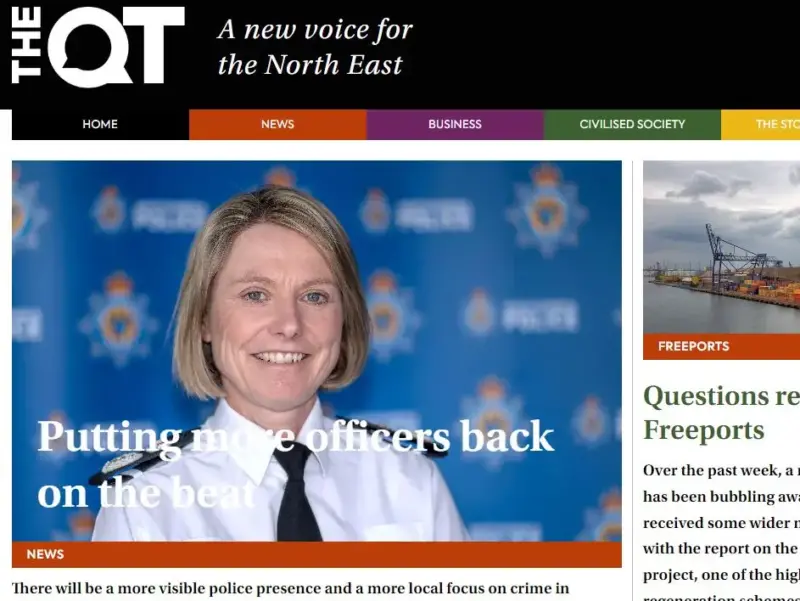
Update 19 July 2024: The QT has “paused” after 24 weekly editions as it looks for further funding.
Founder Brian Aitken said the North East website, which launched in February with investment in the six figures, was intended to grow “as our subscriber numbers increased. Those numbers were heading in the right direction – just not quickly enough.”
“So, we have agreed with our investors that we need to pause and continue to explore ways to raise further funds. I’m all ears,” he said in a “goodbye” email to subscribers, according to Hold The Front Page.
Aitken also wrote: “It doesn’t feel as if it’s The QT’s time to go. We’ve only just begun.
“I would argue that we have been ‘A new voice for the North East’ and have delivered on our promise to provide independent, quality journalism that is worth paying for. The feedback we have been receiving would support this.
“With greater devolution on the agenda and a new government showing its commitment to change, I would also argue that an influential regional voice like ours is more important than ever. The trouble is I can’t argue with a balance sheet.”
Original story 13 February 2024: A former long-serving editor of The Journal in Newcastle has launched a subscriber-based website covering the North East of England that will update once a week.
Brian Aitken, who led the daily between 2003 and 2014, told Press Gazette The QT is “in effect, a quality regional Sunday newspaper that’s not on paper and it’s not on a Sunday”.
He compared it in part to the original “slow journalism” of Tortoise and said while it has a different model of output to the Manchester Mill and its associated newsletter-led titles, they are “spiritually in the same place”.
The QT website will update each Wednesday at 12pm. It has a team of five – four of whom including Aitken are ex-Journal colleagues – as well as a pool of columnists, contributors and commentators that already stands at 30 strong.
The website will not feature breaking news, instead focusing on politically neutral “issue-led campaigning news, features and commentary”. Its first edition led on an exclusive interview with Northumbria’s chief constable written by a former BBC Inside Out presenter, Chris Jackson.
Aitken, who is founder and editor of the site, said: “We won’t be chasing ambulances. We won’t be doing all that blue-light news coverage. We’re not doing breaking news alerts et cetera. I suppose we’re a bit like Tortoise Media in that respect… come to us and you’ll get a certain style of read.”
It will be funded by subscribers and sponsorship, with no adverts on the site.
Subscriptions cost £7.99 per month or £79.99 per year, and Aitken said on Friday afternoon the number of subscribers was already in the “high hundreds” even though the website had only launched two days previously and was free-to-read for its first week. Normally, a limited number of articles as well as events listings will be available for free.

Asked how he decided on the model, Aitken said: “In a nutshell, whenever journalists get together they always talk about the good old days, I can only think that my subconscious must have been working away on a solution to a problem that I didn’t know what I was trying to solve. And that was this whole thing about well, if regional newspapers are dying a slow death, and the circulation declines would say that that is the case, then what can be done? Because so many people are unhappy with their online offerings.
“I’m not here to say that mainstream media companies are getting it wrong. I understand the business rationale behind what they’re doing. I just came to the view that it was worthwhile trying an alternative.
“They’re doing news on the web 24/7 for free, let’s not do that – let’s have an appointment to view once a week, and it won’t be free. They have newspapers as well. Well, let’s not have a printed product to accompany the website. It was about just doing things in a contrary way and thinking would that work?”
Aitken has been backed by Newcastle-based entrepreneur Fiona Cruickshank, who is chair of the board, and six other angel investors who Aitken said are “all local, they all care about the region and they all think that something like The QT’s needed and they want to support it to make it happen”.
The six-figure investment enabled Aitken to develop the platform, build the core team of features editor Sam Wonfor, associate editor Simon Rushworth, senior writer David Whetstone and staff writer Sara Jane March, and fold in Cultured.NE, a regional arts and entertainment site founded by Wonfor which will remain the branding for The QT’s what’s on section.

Aitken said he had been intending to wait to secure more investment before launching but was inspired by The Mill, which he has subscribed to since almost day one and which took a seed round of £350,000 from a list of investors including now-CNN boss Sir Mark Thompson last summer, to get the product out there and then grow it as subscriptions and further investment come in. The QT is part of the Seed Enterprise Investment Scheme, an HMRC scheme that incentivises high-net-worth individuals to invest in start-up businesses.
The latest Digital News Report from the Reuters Institute for the Study of Journalism showed a continued unwillingness to pay for news in the UK: 9% of 2,000 people in the UK surveyed said they had paid for online news in the previous year, up only slightly from 7% in 2016, while 65% said nothing could encourage them to pay.
But Mill Media’s growth since its 2020 launch, with more than 5,500 paying subscribers to three titles as of October, and market research carried out by The QT appears to show people will pay for a certain type of quality content. Aitken said 32% of people in a “robust” sample shown the plans for The QT last year said they would pay for it.
“I think we and the board take the view that this is something that is worth paying for and what’s the point of giving three, four, five articles for free before you charge because my understanding from talking to other people is an awful lot of people do that, get to their limit, and then stop,” Aitken said. “So actually let’s be a bit brave about it.”
He researched examples of subscription models in America and Europe and said “what seems to be working is quality publications or ones that are doing a niche very, very well”.
He cited El Diario in Spain which has a strong loyal membership base despite also allowing people to pay nothing, and The Athletic, the sports brand now owned by The New York Times, about which he said: “What The Athletic does for football in this country, we hope to do for regional news.”
The market research also contributed to the decision not to have any advertising on the site.
“As part of that market research we asked people what was important to them,” Aitken added. “Quality was important, independent, unbiased reporting was important. And the third thing that came out as important was they didn’t want pop-ups and clickbait.
“We all look at media websites, we all know what they contain, and we took the decision that we would not put anything that interrupted the flow of the read.”
The QT, a name chosen on a whim by Aitken with no greater meaning, was set up at Companies House as QT Regions Ltd – the rationale being, Aitken said, that “if this kind of thing can work in the North East, it can work elsewhere”.
However, Aitken himself is focused on using his network from more than 20 years working in the North East and has no plans to expand elsewhere at the moment.
“That’s not to say that we wouldn’t look at some kind of geographical spread of The QT but for the next couple of years we’re focused on getting The QT established in the North East of England… that would make any geographical spread after that easier to achieve, but it’s not on the agenda for now.”
Email pged@pressgazette.co.uk to point out mistakes, provide story tips or send in a letter for publication on our "Letters Page" blog
